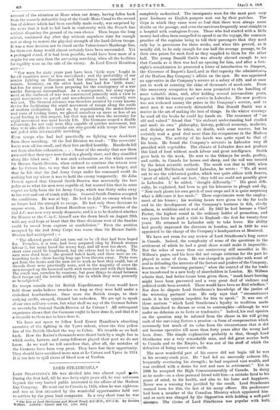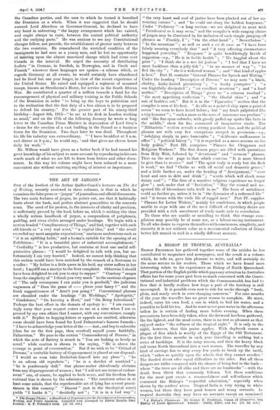LORD STRATHCONA.* LORD STRATHCONA'S life was divided into two almost
equal part. During the first half, till he was forty-eight years old, he was unknown beyond the very limited public interested in the affairs of the Hudson Day Company. Ho went out to Canada in 1833, when he was eighteen, and was at first attracted by the wonderful opportunities held out to settlers by the great land companies. In a very short time he was
• The Lije of Lord Sire:hen= awl Mount Royal, Q.C.11.0., (1.e. FA. By Beetles Willson. London : Catsell and Co. 1.23g. net.]
completely undeceived. The immigrants were for the most part very' poor Irishmen or English paupers sent out by their parishes. The ships in which they came were so foul that there were always some deaths on the passage, and oven the survivors frequently went straight to a hospital with contagious fevers. Those who had started with a little money had often been compelled to spend it on the voyage, the common practice of the captains being to tell their passengers that they need only lay in provisions for three weeks, and when this proved, as it usually did, to be only enough for one half the average passage, to fix their own prices for such food as they supplied to them for the other half. The young Donald Smith was already shrewd enough to see that Canada as it then was had no opening for him, and after a fort- night's consideration he presented a letter of introduction to Simpson, the Governor of Rupert's Land, and in that capacity the administrator of the Hudson Bay Company's affairs on the spot. He was appointed an apprentice in the Company's service at a salary of £20, and at once - put to work at counting the skins of thousands of musk-rats. From this unsavoury occupation he was soon promoted to the handling of more valuable skins, and, after holding several intermediate posts, began in 1848 his twenty years' service in Labrador. His new position was not reckoned among the prizes in the Company's service, and to most men it was extremely distasteful. But Donald Smith was a master in the art of making the best of things. In the winter evenings he read all the books he could Jay hands on. The assurance of "an old and valued" friend that "his stalwart understanding had studied and made its own" philosophy, history, political economy, medicine, and divinity must be taken, no doubt, with some reserve, but he certainly read a good deal more than his companions in the Hudson Bay region. The activity of his hands was quite equal to that of his brain. He found the Company's servants in Labrador very ill provided with vegetables. The climate of Labrador does not produce this kind of food without much labour and great intelligence. Smith gave both to the work. He sent to the Orkneys for seeds, poultry, and cattle, to Canada for horses and sheep, and the soil was treated by the latest scientific methods. The result was that in 1860, when Sir Leopold McClintock visited Labrador, he wrote : "We all went out to see the celebrated garden, which was quite ablaze with flowers,
most of which,' said our host, they told me could not possibly grow in Labrador. I,' he added, thought differently.'" Ills great diffi- culty, he explained, had been to get his labourers to plough and dig. "Now each plants his own patch of root crops and it is quite surprising what a difference it has made." These experiments were the employ- ment of his leisure; his working hours were given to the fur trade and to the development of the Company's business in fish, chiefly salmon, in sealskins and in seal oil. By 1862 he had become a Chief Factor, the highest round in the ordinary ladder of promotion, and two years later he paid a visit to England—the first for twenty-four years. He returned to Labrador only to take leave. His ability had greatly impressed the directors in London, and in 1869 he was appointed to the charge of the Company's headquarters at Montreal.
We have not room for any review of Lord Strathcona's long career in Canada. Indeed, the complexity of some of the questions in the settlement of which he had a great share would make it impossible. But the ashes of more than one controversy still smoulder in Mr. WilLson's pages, and his hero did not escape criticiem for the part he played in some of them. He was charged in particular with want of zeal in defending the interests of the factors and traders of the Company, known as the "wintering partners," when the control of the fur trade was transferred to a new body of shareholders in London. )jr. Willson admits that, had better terms been given them, "much boart-burning might have been prevented and a very great deal of violence and political strife been averted. There would have been no Rid l rebellion." Nor does he dispute Lord Strathcona's knowledge of the justice of the wintering partners' case. He only says that "circumstances made it in his opinion impolitic for him to speak." It was one of those matters "which Lord Stmthcona's loyalty to tradition made him disinclined to discuss or even to contemplate—although he was under no delusion as to facts or tendencies." Indeed, his real opinion on the question may be inferred from the clause in his will giving each of the surviving factors a pension—a form of compensation which necessarily lost much of its value from the circumstance that it did not become operative till more than forty years after the wrong had been done. The simple explanation probably is that, though Lord Strathcona was a very remarkable man, and did great service both to Canada and to the Empire, he was not of the stuff of which the defenders of losing causes are made.
The most wonderful part of his career did not begin till he was in his seventy-sixth year. He "had led an unusually arduous life. frequently overtaxing his strength ; he had acquired vast wealth, and was credited with a desire for rest and ease in retirement." Yet in 1896 he accepted the High Commissionership of Canada. In doing so he made—so a close personal friend told him—a mistake fatal to his peace of mind, to his health, and also to his fame and happiness. Never was a warning less justified by the result. Lord Strathcoms seemed born for this, the last of his many offices. His predecessor- had been a member of the Canadian Ministry which appointed him and as such was charged .by the Opposition with holding a well-paid' aiBecare. The choice of Lord Strathcona was popular with both,
the Canadian parties, and the uses to which he turned it benefited the Dominion as a whole. When it was suggested that ho should succeed Lord Aberdeen as Governor-General, he declined to have any hand in subverting "the happy arrangement which has existed, and ought always to exist, between the central political authority and the outlying parts." He was anxious to see any Constitutional changes follow, not precede, the establishment of greater unity between the two countries. He remembered the wretched condition of the immigrants he had seen as a young man, and he lost no opportunity of insisting upon the almost unnoticed change which had come over Canada in the interval. He urged the necessity of distributing leaflets "in German, in Swedish, in Norwegian, and in Czech and Finnish" wherever these languages are spoken—a scheme which, as regards Germany at all events, he would certainly have abandoned had he lived but one year longer, in view of the recent experience of the United States. He raised and equipped a regiment of mounted troops, known as Strathcona's Horse, for service in the South African War. He contributed a quarter of a million towards a fund for the encouragement of physical and military training in the Public Schools of the Dominion in order "to bring up the boys to patriotism and to the realization that the first duty of a free citizen is to be prepared to defend his country." For the greater part of his ninety-third birthday—August 6th, 1913—" he sat at his desk in London working as usual," and on the 17th of the following January he wrote a long letter to the Canadian Prime Minister in deprecation of Lord Grey's seheme for the erection of a vast building in the Strand as a business house for the Dominion. Two days later he was dead. Throughout his life his industry was extraordinary. " I have breakfast at 9 a.m. and dinner at 9 p.m.,' he would say, 'and that gives me eleven hours daily for work.'" Mr. Willson would have given us a better book if he had turned his great knowledge of his subject to more account by reproducing in his own words much of what we are left to learn from letters and other docu- ments. In this way his volume might have been reduced to a more convenient size without omitting anything of interest or importance.



































 Previous page
Previous page